12/21/68. SkyMan says 50 years ago today Apollo 8 launched.
Fifty years ago today, 12/21/1968, Apollo 8 launched. It was the first trip ever to the Moon.
Originally Apollo 8 was conceived of as a high orbital test flight of the Command and Service Module (CSM) and the Lunar Module (LM). The CSM had been tested in Apollo 7 in October 1968, but the LM had never flown. It was planned to send both spacecraft on an elliptical orbit around the Earth with a high point altitude of 4,000 miles. The LM was not ready for use by December 1968, and in fact would not be ready until late February, early March 1969.
In the summer and fall of 1968 it was feared the Soviet Union might beat the US to the Moon. Unmanned Soviet spacecraft carrying live organisms had made circumlunar flights. Circumlunar flights are basically shaped like a figure 8, the spacecraft flies to the Moon, circles around it, and comes right back to Earth. TECHNICALLY it was far simpler than what the US was planning, but still, for propaganda purposes, it would allow the USSR to "win" the Space Race of sending the first man to the Moon.
Various of the higher ups in NASA decided that not flying an Apollo spacecraft until March 1969, and even then only doing a high orbital flight, would give the Soviet Union a serious chance to beat the US to the Moon. In August 1968, George Low, the manager of the Apollo spacecraft program office, discussed with Bob Gilruth, the director of the Manned Spacecraft Center (MSC), Chief Flight Director Chris Kraft, and head of the astronaut office Deke Slayton, the possibility of sending the Apollo 8 CSM on an orbital mission around the Moon. James Webb, the head of NASA, after some convincing, agreed with the mission, and okayed it.
The mission was unquestionably the riskiest manned mission ever flown by NASA until the first Space Shuttle flight (which was the first time the first flight EVER of a NEW space vehicle was manned). For Apollo 8 the CSM had only flown manned once. Here it was going to go all the way to the Moon, which meant in case of an emergency, at it's furthest distance, the spacecraft would be roughly a 3 days journey from Earth. The Saturn V was the launch rocket. It dwarfed any other US rocket existing at that point in time. (The Soviet Moon rocket, while technically more powerful at launch, was not nearly as efficient and could not send nearly the same mass to the Moon. Furthermore, it NEVER successfully flew). The Saturn V had been flown unmanned twice before Apollo 8, and had some serious issues crop up on the second test flight. So, the risks involved an incredibly powerful, but iffy rocket, and a voyage in a new spacecraft, to go roughly 1,000 times further away from the Earth than had ever been attempted. The stakes were high, but NASA management took the chance.
On December 21, 1968 Commander Frank Borman, Command Module Pilot Jim Lovell, and Lunar Module Pilot Bill Anders launched to the Moon. Roughly 3 days later on December 24th they went into orbit around the Moon. They orbited the Moon 10 times, with each orbit lasting 2 hours. On their fourth orbit they were the first humans ever to witness an "Earthrise". They took several pictures, with one of the pictures becoming one of the most famous pictures of all time.
On their ninth orbit (Christmas Eve) they had a TV broadcast with the Earth. During this broadcast they read portions of the first chapter of Genesis, starting with, "In the Beginning...".
After 10 orbits, on December 25, the crew fired the CSM engine behind the Moon to return to Earth. While the spacecraft was behind the Moon, it could not communicate with the Earth. If the engine had not fired, the crew would have been stranded in lunar orbit. Chris Kraft, the lead Flight Director from the earliest manned US space flights to the end of the Apollo missions, stated that the ~ 50 minute wait while the CSM was behind the Moon, to see whether the rocket engine had fired or not, was the single most stressful point of his career. The engine fired, and when the spacecraft came around the Moon, Jim Lovell radioed, "Houston, please be informed, there is a Santa Claus".
On December 27 the Command Module successfully splashed down in the South Pacific. At this point the Great Space Race between the USA and the USSR was effectively over.
Here are some pieces from my collection:
A $1 bill, signed by both Borman and Lovell.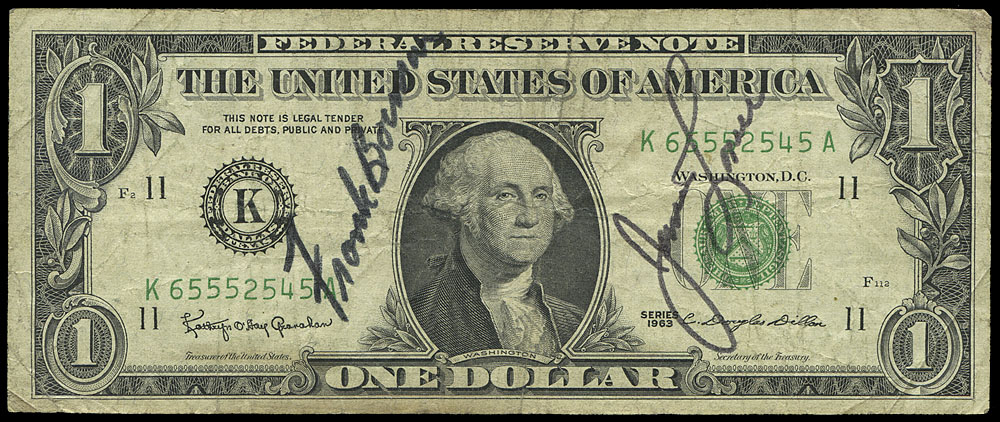
Here's a 16" X 20" Earthrise picture signed by Borman with the quote, "In the Beginning...", and by Lovell, "A Grand Oasis..." (from one of his comments on seeing the Earth from the Moon). Sorry, there is a reflection on the picture from the flash used to image it.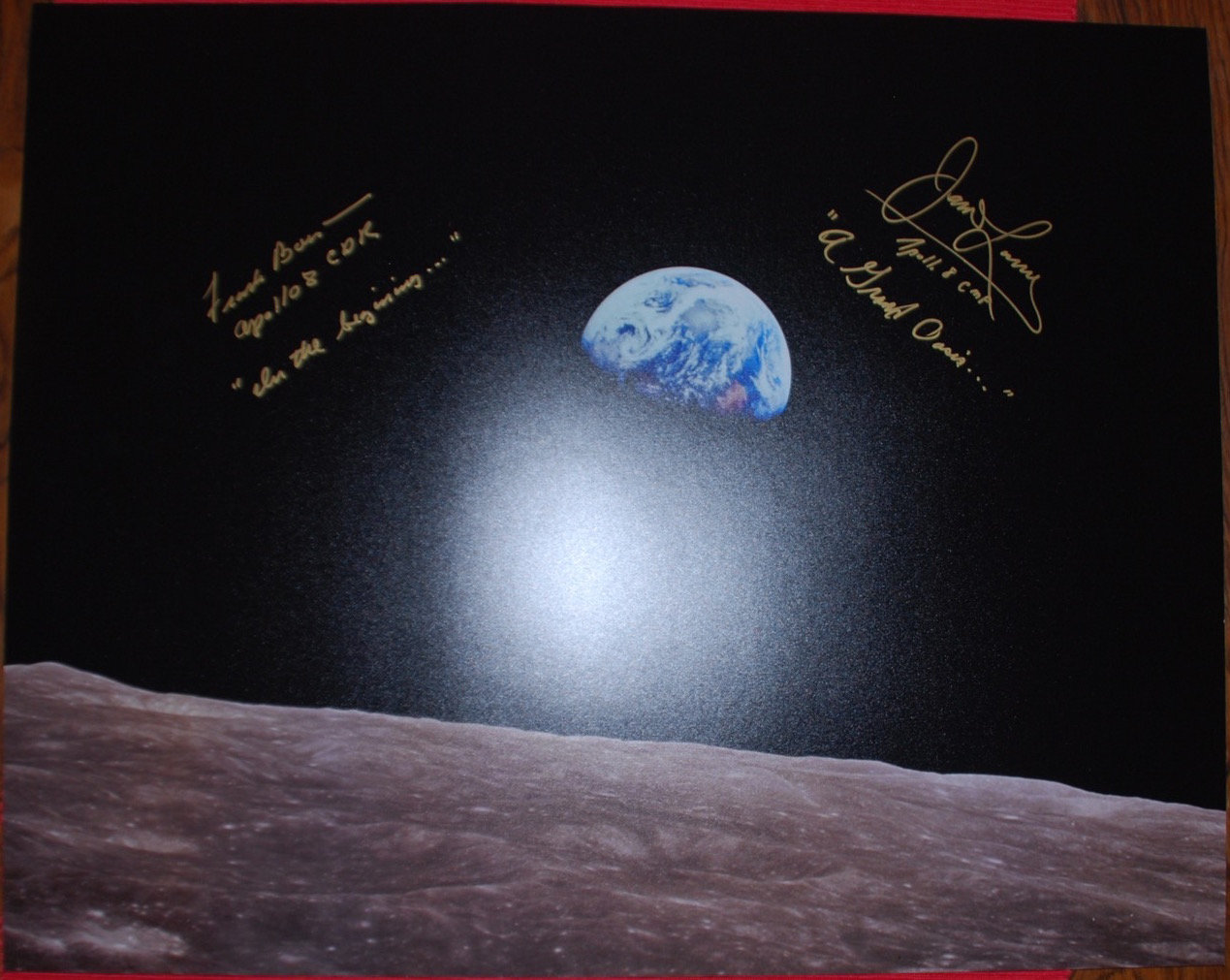
One of my favorite pieces in my collection. When Lovell was a plebe at the Naval Academy, at an Army-Navy football game, he traded one of his cufflinks with a West Pointer. Years later, when he was the backup pilot for the Gemini 4 flight, he got to talking with the prime pilot for the Gemini 4 flight, Ed White II. Lovell mentioned about trading his cufflinks at the game, and mentioned that he never got the name of who he had traded cufflinks with. Ed White said, "Holy Mackerel (or words to that effect), that was me!" On Gemini 4, White became the first American to walk in space. Unfortunately he was killed in the Apollo 1 fire. In memory of his friend, Lovell brought the mixed pair of cufflinks with him on the Apollo 8 mission.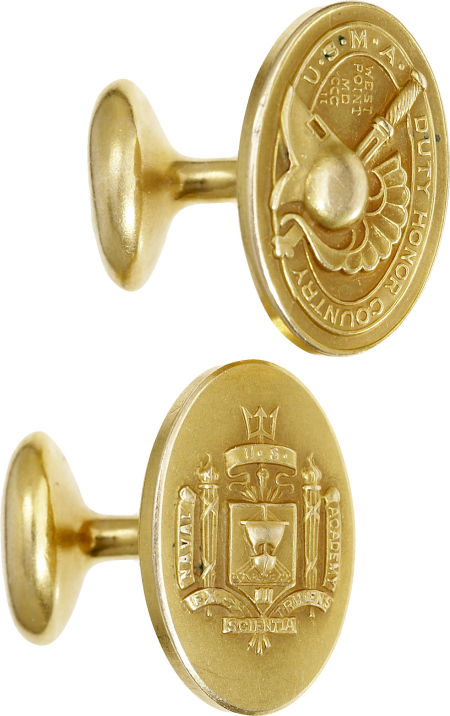
Comments
Apollo 8 is my favorite manned space flight ever, even more so than Apollo 11.
I remember being glued to the TV with my parents and sister during this flight.
Hard to believe it was fifty years ago.
These astronauts had and still have guts considering all the risks involved in space flight. Now 57 years after man first flew in space the whole endeavour is still very dangerous.
One comment on beating the USSR to the moon, after the untimely demise of Sergey Korolyev in 1966 the Soviet moon programme effectively ended. Unfortunately the Soviets had all their space programme invested in one individual, Korolyev. He was a brilliant engineer who worked under a government that had even persecuted him for alleged anti-government.
While I was typing the above I was watching the CBS news and they had a report on the anniversary and an interview with Jim Lovell - he said they were told they had a 50% chance of success, I'm glad the glass was half full.
Wow!
@SkyMan
Thank you for that wonderful narrative!
This is a fantastic accounting of how the iconic "Earthrise" photo came to be taken....
 https://www.youtube.com/watch?v=dE-vOscpiNc
https://www.youtube.com/watch?v=dE-vOscpiNc
Sy, here's one that I wish I still had.
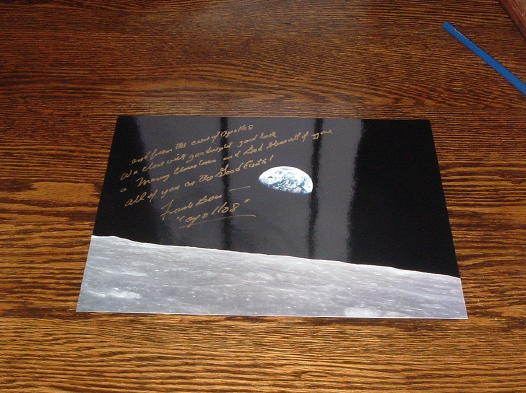
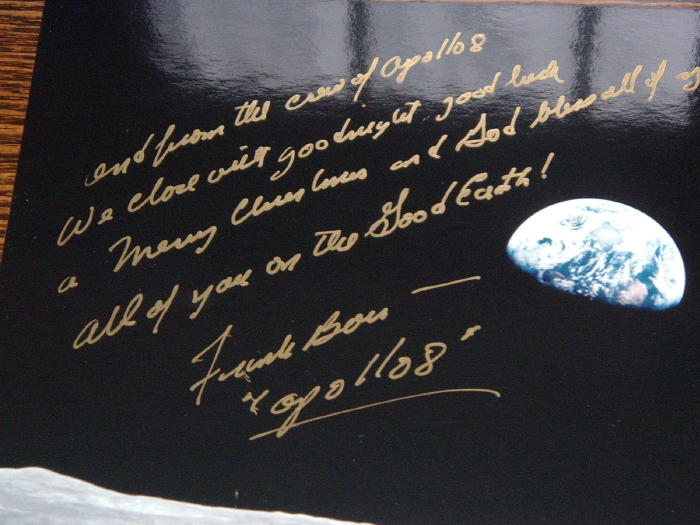
I recall seeing (but not speaking to) Frank Borman when he visited the offices of Campbell-Ewald Advertising in Warren, MI. I don't recall the exact year but it was probably around 1980-81. At the time he was the head of Eastern Air Lines and the agency was pitching the account (which they won.)
Actually, one of the fascinating aspects of the 1960's space race was that the capitalist USA free enterprise system produced a MUCH more centralized and streamlined Moon project than the USSR communist centrally planned economy. The USSR had various enterprises and "bosses", including Korolev, who clearly stood above the others. These enterprises and bosses split the resources of the country. In some cases they were quite antagonistic to each other.
The US, on the other hand, had a fairly streamlined chain of command, and more or less all marched to one drummer.
U.S. Type Set
Jim Lovell retired to the far north suburbs of Chicago. Opened a nice restaurant. Was friendly with one of the talents on WGN radio and would chat if called.
When the movie “Apollo 13” came out they naturally chatted about the mission and the movie. The talent asked him how his wife had reacted to the near disaster, and he said that she had held up well, but after they had safely landed she went out to the press mob and announced his retirement from the space program!
I was reading in "First Man", about Neil Armstrong, that NASA had absolutely no support system for the wives and families of the astronauts. More than 50% of their marriages ended in divorce.
Lovell had already decided to retire before the mission, as his main interest was to land on the Moon, and he knew, given budget realities, that he wouldn't be getting another chance.
The space program was brutal on the marriages of not only the astronauts, but also the engineers and technicians that worked on developing and building the machines and procedures that won the space race. A LOT of the astronauts, engineers and technicians ended up getting divorced, and from what evidence we have from the other side, the same thing occurred in the USSR.
Apollo 8 is basically an unheard of rarity in that all 3 astronauts are still married to their original wives. It is known that Borman's wife Susan suffers from Alzheimers, and he still helps to take care of her. I suspect doing that is helping to keep him alive. Unfortunately the odds are that all 3 of the crew will be dead within 5 years, and most likely much sooner. Borman and Lovell were born in 1928, and Anders was born in 1933.
U.S. Type Set
It was - and still is - one of the most amazing periods in American scientific and engineering history. Positively amazing achievements and of course the information and technology that flowed from the program. Cheers, RickO
Just watched a special on Jim Lovell . . . . .
What heroes those men were.
I still owe you some keepsakes from the YF-12 . . .I have not forgotten . .
Drunner
Great read
Steve
This just released on Friday by NASA.
I always enjoy your posts regarding the early space exploration years SkyMan... Once again thank you!
Still hale and hearty after all these years
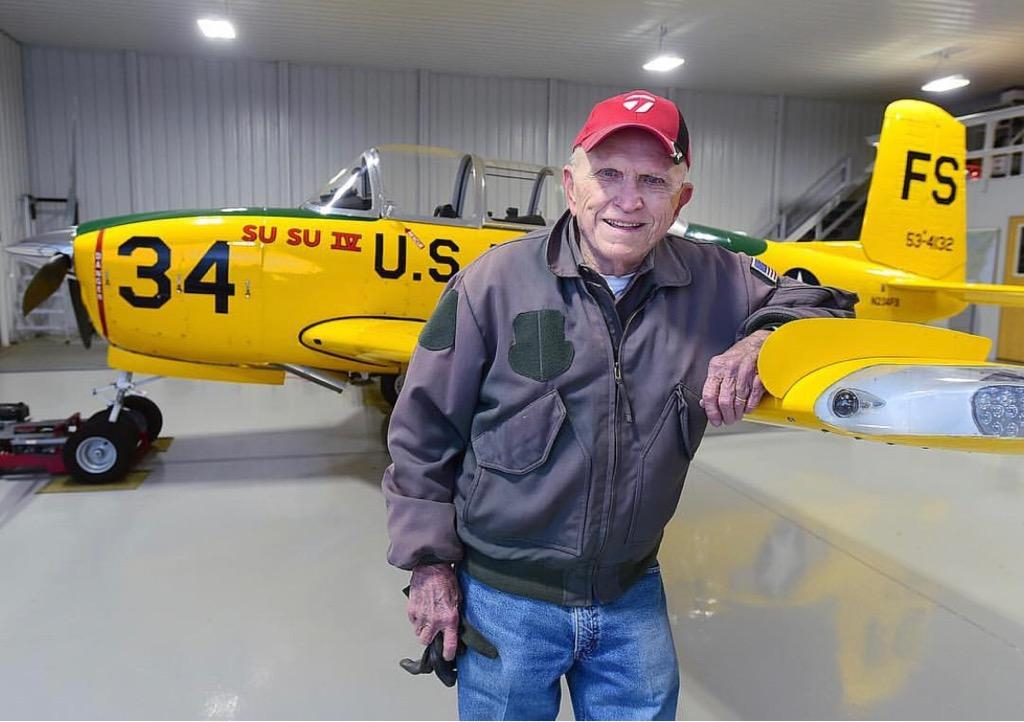
"Inspiration exists, but it has to find you working" Pablo Picasso
Always look forward to your posts regarding our space program.
@SkyMan and all others.
Just a heads up that PBS is airing a programme on NOVA tonite called "Apollo's Daring Mission" about the December 1968 Apollo 8 mission.
What's the imperative? What's pushing us to go to Mars?" Anders, 85, said, adding: "I don't think the public is that interested."
The more qualities observed in a coin, the more desirable that coin becomes!
My Jefferson Nickel Collection
The imperative for Apollo 8 was to beat the Soviet Union.
As for exploring in general, the imperative is being human. It is part of our DNA. Those that explore have the chance to find new fields, sometimes literally, sometimes figuratively. Those cultures that explore tend to do well. Further, cutting edge technology, however you get it, tends to give the underlying economy a competitive edge with regards to other economies. The amount of money we have put into the space program has been returned to us many times over in new technologies and procedures. I'm not talking about Tang or Teflon. Probably the most significant return from the race to get to the Moon was the miniaturization of medical devices, it opened up significant new areas in medicine, such as arthroscopic surgery etc.
One of the more interesting comments I heard about why go to Mars was by Scott Carpenter, one of the original Mercury 7. His response was, "It's inevitable". It's what humans do.
U.S. Type Set
Thank you for the info, I was 8 years old, followed the Space Program, and will never forget that Christmas Eve!
My Father and I listened to the radio broad cast, and later went out to view the moon.
There was a star, perhaps an aircraft that appeared to be circling the moon, my Father said 'maybe' that was the Astronauts orbiting the Moon.
To this day I swear that's what I saw and would pass a polygraph test!
https://www.foxnews.com/science/sending-astronauts-to-mars-would-be-stupid-says-apollo-8-astronaut
The more qualities observed in a coin, the more desirable that coin becomes!
My Jefferson Nickel Collection
You already paraphrased Anders' comments in your 1:15 pm post, to which I've already responded (also, FWIW, I had already read those comments previously). If you have nothing new to say, why are you reposting? With all due respect, I could also create a partial list of all the astronauts that do support going to Mars with humans.
That list FAR outnumbers those that don't support going to Mars. While I have never met Anders, I have met 12 of the 24 men that went to the Moon, (and am lucky enough to call two of them friends), and well over 30 astronauts from the space shuttle era. They might have disagreements as to what and how the next step might be in space, but they all STRONGLY support HUMAN exploration, with robotic exploration being an IMPORTANT ADJUNCT.
As in all human endeavors, there are those that support and those that disagree with any given position. I am sure there were those that were high in the Spanish government of Ferdinand and Isabella that said, "Why should we give money to Columbus?" At the end of the day, assuming humans don't kill ourselves via war, overpopulation, pollution etc. etc. I agree with Carpenter, going to Mars is inevitable.
U.S. Type Set
Meanwhile, a new image from the latest Mars probe:
The Mysterious Egyptian Magic Coin
Coins in Movies
Coins on Television